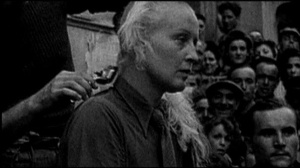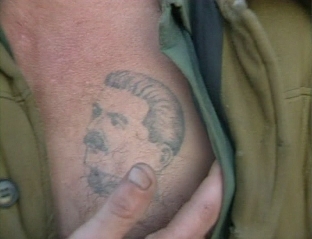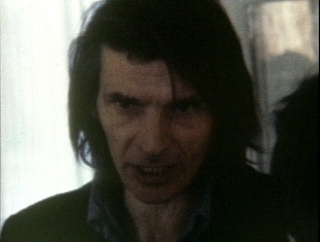


Eut-elle ete criminelle
[Even if She Had Been a Criminal . . .]
by Jean-Gabriel Periot, 10 min, video, 2006 (SF
Premiere)
France 1944. Paris is finally liberated from Nazi occupation. De Gaulle's Free French Forces and American troops are greeted with jubilation, and the streets are full of private expressions of joy and public rituals of victory. But after a bloody and brutal war victory has a dark side. Marguerite Duras' eloquent but troubling work, The War [La douleur], gave expression to what that victory could mean for those who fought in the Resistance, lost loved ones, and felt betrayed by fellow countrymen. It could mean a settling of scores, a turning of the victor, ever so briefly, into victimizer.
Orchestrating carefully combed archival footage and various renditions of La Marseillaise, Jean-Gabriel Periot's Even if She Had Been a Criminal ... gives visual form to this psychologically complex historical moment when joy was coupled with hatred, long-awaited triumph with a need for scapegoats, and pride with public humiliation.
Jean-Gabriel Periot is an artist, writer and filmmaker based in Tours, France. His shorts have won numerous awards, and Even if She Had Been a Criminal ... received the Grand Prize at the Tampere International Film Festival and the Arie & Bozena Zweig Innovation Award at the Chicago International Documentary Film Festival.
The Embassy
by
Chris Marker, 21 min. super 8mm (shown on DVD), 1973
Chris Marker's The Embassy shows political dissidents seeking refuge in the French embassy after the military coup d'etat in Chile. Over the next few days, more and more people fleeing the military assault - teachers, students, intellectuals, artists, and politicians-arrive at the embassy.
An anonymous cameraman records the tense situation with his Super-8 camera, and provides a voice-over commentary, as the Ambassador and his wife arrange to house and feed the growing group, who monitor radio reports of the alarming political developments-including thousands of political prisoners detained in a stadium, and reports of executions-and glimpse activities on the streets outside. The refuge-seekers accommodate themselves to the makeshift living arrangements, find ways to pass the time, and engage in often heated political debates.
An Anagram
by
Daniel Barnett, 42 min. video, 2003 (World premiere)
On August 19, 1991 when Mikhail Gorbachev was nearly overthrown in an attempted coup, ABC news sent Gary Henoch to Moscow to cover the events that followed. In the early 1980's Henoch had been ABC's Moscow producer/cameraman. He was astounded at the changes following the collapse of Communism. He asked his friend, Russian scholar Harlow Robinson to join him in Russia to document the impact of the changes in Russian society. Upon his return, after weeks of filming interviews and street scenes in Moscow, Yoroslavl, and Rostov Veliky, he turned the footage over to a well-known PBS series, but the rough-cut that emerged appalled him and he pulled the footage.
Some months later I was editing an industrial that Henoch had shot. He stopped by the editing room and we fell into a conversation. I was impressed that such an experienced hand would show up and ask if there was anything I needed that he failed to get. Was there anything he could have done better? In fact there was nothing. He was by far the best cameraman whose footage I had the honor to edit. He told me the story of his trip to Russia and asked if I wanted to see the material. What I saw was forty hours of footage that captured the results of a civilization having had its belief system knocked out from under it.
Henoch saw that my passion for the footage was genuine and offered to give it to me to do with as I pleased. Over the next eleven years, in my spare time, and in between other jobs, I would work on the footage, solving one structural problem after another, until I finally became satisfied that I had caught the essence of the story.
An Anagram is an essay in changing parts. It trades in what Paul Auster calls "a syntax of the eye, a grammar of pure kinesis." It wears the soul of historical disappointment on its sleeve.